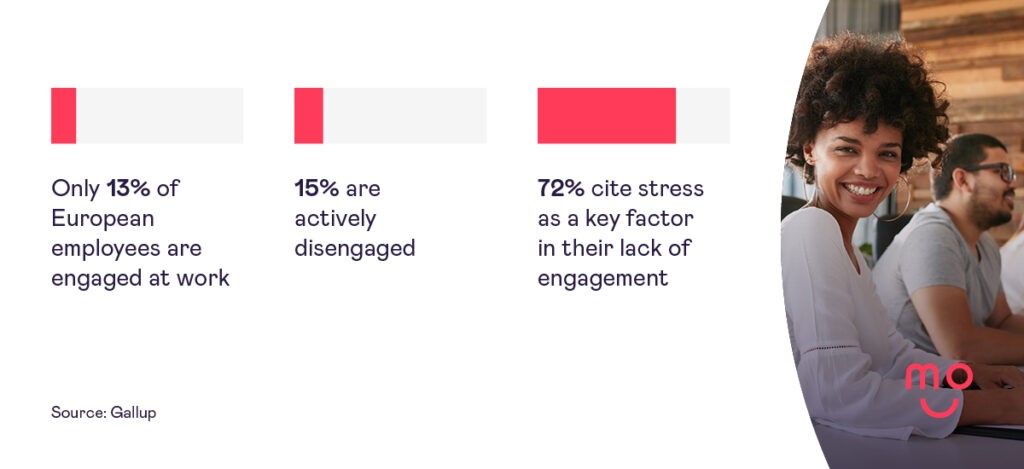Motivating employees is the key to sustained productivity. Every good manager knows the most valuable asset is not new equipment or flashy software. Your best asset is your people. Talented and passionate colleagues make all the difference – as long as they remain motivated.
Research shows engaged team members perform 20% better and are 87% less likely to leave a company. If you keep motivation levels high, you will retain hard-working employees.
Bringing out the best in your team requires time and attention – measuring employee motivation is not enough unless you take action. Mo has designed an employee recognition platform that makes motivating your employees simple.
Why is motivating employees important?
When employees feel motivated, they are more likely to be productive. Bloomberg recently reported falling motivational levels in US employees, finding that the majority of employees are not highly motivated – directly impacting productivity. The Guardian found that managers are fundamental in instilling and maintaining motivation in their teams – and that means tapping into the needs of each employee.
There is a theory that states there are three driving factors for human motivation: achievement, affiliation and power. Every employee will be driven by at least one of these – possibly a combination of all three.
- Achievement is all about accomplishing goals, taking calculated risks, receiving constructive feedback, and for the most part working alone to help achieve these goals.
- Affiliation is working with others, feeling liked and valued, having a preference for working collaboratively and a dislike of taking risks.
- Power then refers to the desire to have control and the ability to influence others, win arguments, compete and achieve the desired status.
A manager’s goal is to understand where their team falls on this scale. What will motivate your team members and how do you plan on implementing strategies that will keep them motivated?
Want to find out how to motivate your team with recognition prompts? 👉 Book a demo.

How to improve employee motivation
Highly motivated employees are easy to spot – they exceed objectives, present a positive attitude, contribute ideas and support their colleagues.
Now that we have demonstrated the connection between team motivation and better metrics, let’s jump into our easy and actionable ways to get started.
1. Improve management
Bad management is often cited as a reason why people leave companies. And even if they remain, employees may be quiet quitting.
Ensuring that your management teams are effective is the first step towards fixing motivation problems.
Leaders and managers are not the same – but both are essential. Consider restructuring your senior management team to make strategy seamless. When employees sense a strong direction, they will feel more inclined to support your efforts to succeed.
2. Flexible working
It is a legal right to request flexible working – including remote work or adjustable working hours. However, many employees feel they have not been given fair access to flexible work. Not only are companies limiting their scope of potential employees by demanding office attendance, but they are also punishing people who have caring commitments.
While many workplaces have increased their flexibility in recent years, dissenting voices persist. Our analysis of our customers finds that offering staff a way to manage their work-life balance will improve their motivation and reduce employee stress. Before you rule out flexible work, try it with your staff. You might be surprised how much it boosts your productivity levels.
3. Achievable goals
Completing a task is a huge motivator for employees. We have seen evidence that recognising goals, big and small, is essential for maintaining team motivation.
It is tempting to emphasise objectives that are easily qualifiable – but smaller, “invisible” tasks are also important. Collaborate with your employees to formulate a series of attainable goals they can work on at their own pace.
An employee recognition platform will keep track of milestones and birthdays, making it easy to encourage your employees without adding admin to your managers’ workloads. Mo‘s software is configurable to your company’s unique needs – making it simple to recognise achievements that matter to your team.
4. Basic needs vs relational needs
Many managers tend to focus on basic needs rather than the relational needs of their employees. While focusing on pay and compensation is important, factors like human connection, appreciation and personal growth are those that employees care about.
While these relational factors may seem less practical, they often play just as big or a bigger role than basic needs. When needs are neglected, you may see a reduction in investment and drive from your employees.
Aim for a balance between different needs to maintain employee engagement. Anytime you consider your staff’s basic needs, make a mental note to consider their relational needs and look for opportunities to readdress the balance.
5. Office culture
While offices matter less and less to younger generations, no one wants to work in a cold, boring workspace for hours. Having an aesthetically pleasing and functional office will make going to work a more pleasant experience – especially if you are going to enforce office or hybrid work.
Explore ways of adding more light, investing in new technology, and updating outdated systems. Make it a place your employees feel comfortable spending time in by consulting them. Most changes are simple and easy.
6. Professional growth
There is nothing worse than feeling stuck in a job with no growth. Investing in your employees’ future will motivate them to achieve excellence in the present.
Offer skills training and growth courses – but remember, there is a difference between coaching and mentoring. By changing things up and giving them room to grow, employees have goals to invest in, which is a huge motivational driver.
7. Better communication
As a manager, it can be difficult to make time in an already tight schedule. However, you should make an effort to be present for your staff and stick to it. There are numerous benefits:
- Model positive behaviours
- Build trust
- Streamline processes
If the main goal of improving employee motivation is better productivity, ensuring that your communication is fast and effective will help your metrics.
Remote employees receive less feedback than those who work in the office. Try and be as available as you possibly can for your staff and make sure that your one-to-ones are meaningful, rather than perfunctory.
8. Positive leadership
At some point in every person’s career, they have or will work with an unapproachable and unrealistic manager. Even if you love your job, miserable managers will spoil it, so why not aspire to be someone you would like to work for? Share your positive outlook and your team will follow by example.
Get to know your team. Having one-to-one relationships with your employees will make you more personable. Be understanding and transparent, as no one wants to feel uncomfortable when talking to a manager about a mistake or something they need to do. All of the above are easy ways to keep your employees happy and motivated.
9. Offer your team autonomy
In addition to allowing flexibility when it comes to work-life balance, offer autonomy where possible. Micromanagement can be the quickest way to sap employee investment, as it makes people feel as though they can’t be trusted and wastes valuable time.
It is essential that you have regular check-ins and that you agree on goals and workloads together. It is also important to bear in mind that some employees prefer more guidance than others but taking a step back can leave space for self-motivation to flourish.
10. Recognise great work
One of the biggest contributors to employee motivation is employee recognition. More than 70% of workers said that motivation and morale would improve massively with increased recognition from their managers.
It is not just about recognising outstanding work, it is about how you recognise your employees. Employee recognition is not just about a bonus or a £5 Amazon voucher. It should be regular, meaningful, personal and timely. It also doesn’t always need to be monetary or in the form of a reward. A simple thank you is more than enough at times.
Motivating Employees: Key Takeaways
- Employee motivation is crucial for sustained productivity, with engaged team members performing better and less likely to leave a company.
- Managers must understand the driving factors behind employee motivation, including achievement, affiliation, and power, to implement effective strategies.
- Ways to increase motivation in the workplace include improving management, offering flexible working arrangements and setting achievable goals.
Need help with employee motivation? 👉 Book a demo with our friendly people.




